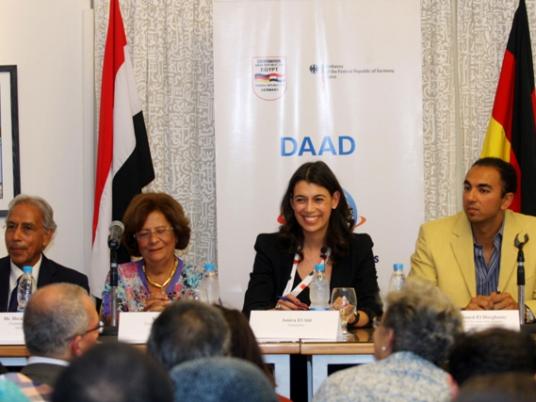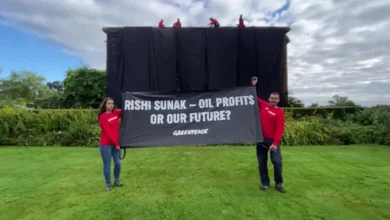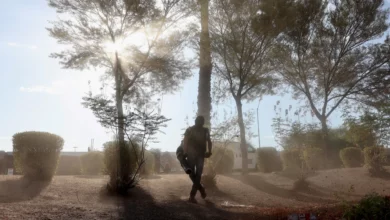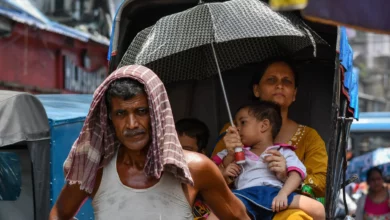
The UN estimates that the world’s population will reach 9 billion by 2050. As the population increases, so will the demand for dwindling natural resources.
“We have to find our course towards a world that can live with one planet. Given today’s exploitation rate of the environment, you will end up using two or three planets,” said Dr. Günther Bachmann, Secretary General of the German Council for Sustainable Development.
Bachmann was one of four experts who met Tuesday in Cairo to discuss the future of sustainability in Egypt, and the outcome of the Rio+20 United Nations Conference on Sustainable Development.
The event, “Paving the Way to a Sustainable Egypt,” was part of the monthly Cairo Climate Talks, a forum for Egyptian and German experts to discuss climate-related issues with policymakers, business and scientific communities, civil society and the public. During the event, which was held at the German Academic Exchange Service in Zamalek (DAAD) and moderated by journalist Amira El-Ahl, panelists discussed practical ways to meet sustainable development challenges.
According to the United Nations, sustainability means creating an adequate standard of living for everyone, but without compromising our ability to meet the needs of future generations.
Sustainability, says the UN, is also inextricably linked to issues of equality and social justice, and making access to a higher quality of life accessible to all. The forecasts for climate change in Egypt could make meeting that goal all the more difficult.
According to a 2009 report by the Arab Forum for Environment and Development, the Arab region is among the most vulnerable to the adverse effects of climate change.
The region, the report said, is likely to experience diminished agricultural capacity, more droughts and heat waves, water shortages and loss of low-lying coastal areas.
For example, a sea level rise of 1 meter would inundate a third of Nile Delta land, and displace up to 7 million Egyptians. That’s the lowest estimate of possible sea level rise, according to the report.
The panelists were optimistic Egypt can meet climate change challenges and create an environmentally sustainable future, but stressed the need for creative approaches and taking concrete action now.
Among the main topics of discussion were transportation issues and the idea of a green economy. Sustainability can be profitable, the panelists said. They also linked sustainability to shifting cultural attitudes.
“The big challenge is addressing the social aspect of transportation, not the infrastructure,” said panelist Ahmed El Dorghamy, co-founder of the Green Arm of Nahdet El Mahrousa and a consultant at the Center for Environment and Development (CEDARE).
Dorghamy said the Green Arm and environmentalists in general are calling for a shift from private vehicles to public transportation. He stressed the need to use social marketing to induce what he believes are the necessary cultural shifts to solve the problem of traffic congestion.
“Social marketing is a social tool that was used very effectively by corporations. If we use it as effectively as they can use it, I think in no time you can have the message being delivered to everybody,” he said.
Yet he also emphasized the need for people to take action now and work together.
“Whatever problem you face that makes you refrain from using public transportation, face it. If you get harassed, solve the problem. If you think that it is unsafe, then work on the problem, because who else will?” Dorghamy said.
One audience member, Sherine Maher, agreed there is a need to take action.
“Talking is not enough,” she said. “I think all the environment in Egypt must be protected because we are in a disaster. The water is polluted and I think the food also. Myself, I always feel tired and I can’t concentrate. I think it’s because of the pollution.”
Panelist Syada Greiss, head of the Environmental Protection Association, said that there is an unhealthy drive for profits that only adds to challenges.
“We are promoting the wrong products, we are not promoting healthy products, we are promoting consumerism to make profits,” she said.
She also stressed the need to empower women.
“You cannot have a country that can develop without empowering its women. Not being inclusive is a major challenge for us today,” she said.
Greiss said it’s important to work on challenging cultural constraints and barriers that have held women back from becoming partners for change.
Yet all the panelists agreed that the most immediate challenges facing Egypt are making clean energy accessible to the masses, providing proper nutrition and clean drinking water, and finding ways to alleviate poverty, all while protecting the environment.
In this regard, Bachmann, who attended the international Rio+20 conference, said there is a need to consider different sustainability issues in different parts of the world.
“One thing we have to learn is that there’s no one size fits all approach. One has to look into the concrete situation in the respective country or the respective region, or respective city or community to come up with some solutions,” he says.
Panelist Ibrahim Abou Leish, founder and chairman of the SEKEM Initiative that works on sustainable development, was optimistic about Egypt’s future.
“Thirty-five years ago, everybody was predicting failure. But now everybody in Egypt is enjoying organic foods, organic medicine and organic clothes,” he claimed. “That means you can do business and keep the environment clean.”




